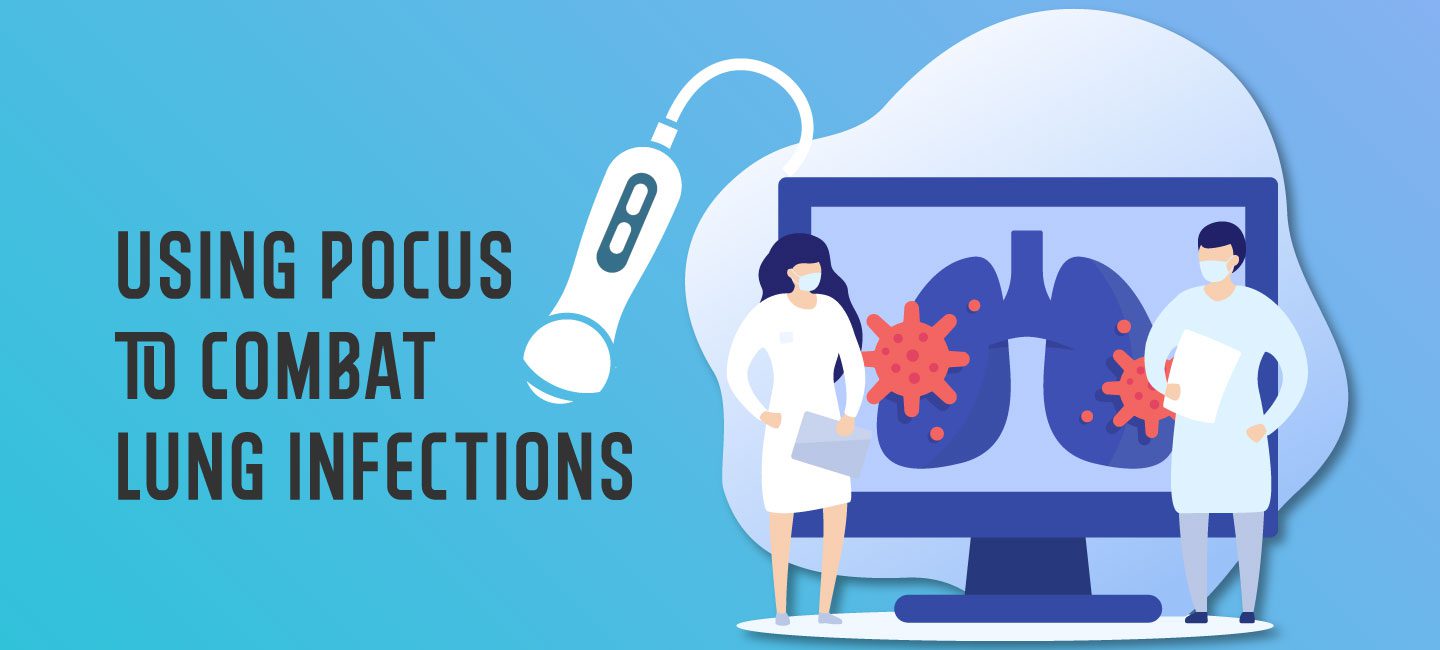Point-of-care ultrasound (POCUS) provides healthcare professionals direct and immediate diagnostic insights that support their ability to provide the timely care that their patients need. This modality allows healthcare professionals to collect important diagnostic information at the point of care. In turn, medical workers can further streamline the direction of care and provide information to their patients sooner. As a portable, affordable tool, POCUS has elevated patient care in urban and rural settings globally.
One function of this modality that has received increased awareness since the coronavirus (COVID-19) pandemic started is the value of using it to conduct lung ultrasounds. Respiratory diseases and infections can impose drastic, life-altering effects on patients. From observing lung damage in COVID-19 patients to providing valuable diagnostic information regarding a large number of lung conditions, the portable, immediate nature of POCUS supports healthcare professionals and patients.

POCUS as a Frontline Tool Against COVID-19
As this pandemic continues to highlight how preexisting conditions such as respiratory issues can leave members of the world more vulnerable to severe cases and outcomes, it serves as a reminder of the importance of providing the highest standard of care to all patients. A need that POCUS supports.
Since the early stages, POCUS has proven to be an instrumental tool in diagnosing and monitoring COVID-19 patients. Even as new medical advancements, vaccines, and knowledge become available, POCUS continues to help healthcare providers combat this disease. Through the efficient, early use of POCUS, healthcare providers are in a better position to gauge if patients will likely need oxygen, intensive care, or other medical needs.
While attacking the lungs of infected patients, this virus can also lead to even more severe conditions and complications.
“COVID-19 can cause lung complications such as pneumonia and, in the most severe cases, acute respiratory distress syndrome, or ARDS. Sepsis, another possible complication of COVID-19, can also cause lasting harm to the lungs and other organs,” said an article from John Hopkins by Panagis Galiatsatos, M.D., M.H.S.
In the article, Dr. Galiatsatos listed three factors that influence lung damage risk and recovery in COVID-19 patients:
- Disease severity
- Health conditions
- Treatment
Regarding the third factor, Galiatsotos notes that “a patient’s recovery and long-term lung health is going to depend on what kind of care they get, and how quickly.”
Although this report focused on how COVID-19 can lead to lung damage, it has long been recognized in the healthcare community that timely, efficient care is instrumental in cases of lung diseases and infections.
The Role of POCUS in Diagnosing Lung Conditions
Awareness of the diagnostic value and benefits of lung ultrasound is not new in the healthcare community. As a “quick, bedside based, affordable, reproducible method,” lung ultrasound supports healthcare workers as an imaging modality used for diagnosing a range of diseases beyond COVID-19.
A 2019 white paper details how lung ultrasound assists providers in diagnosing pneumonia in pediatric and adult cases. Additionally, POCUS has also been reported as instrumental in identifying other lung conditions such as:
- Bronchiolitis and other viral illnesses
- Pulmonary fibrosis and other interstitial lung diseases
- Acute respiratory distress syndrome (ARDS)
Proving Point-of-Care Improves Patient Outcomes
By using POCUS when their patients present respiratory issues, healthcare providers save valuable time. The immediate diagnostic insights that POCUS provides helps medical workers determine the direction of care that will improve the outcomes for their patients.
Especially in respiratory cases where initial symptoms can appear minor but be indicative of something more severe, time is key. POCUS gives healthcare professionals and patients a head start, and in turn, improves patient care and results.
Are you interested in adding POCUS to your toolbox? Learn more about how our Fundamentals Certificate can support you.





















